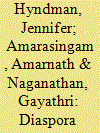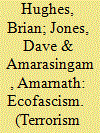| Srl | Item |
| 1 |
ID:
184327


|
|
|
|
|
| Summary/Abstract |
During the mid to late 1980s tens of thousands of Tamils from Sri Lanka sought and got asylum in Canada, forging the basis of the sizeable diaspora today. The Canadian state granted overwhelmingly positive decisions to Tamil refugee claimants based on evidence that the Government of Sri Lanka colluded in systematic violence against and killing of Tamil civilians who were not part of the militant separatist rebel group known as the Liberation Tigers of Tamil Eelam (LTTE). Canada continues to accept a majority of Tamil asylum seekers today, and hosts diaspora geopolitics – a less state-centric politics among diaspora members – ‘from below’.
|
|
|
|
|
|
|
|
|
|
|
|
|
|
|
|
| 2 |
ID:
188064


|
|
|
|
|
| Summary/Abstract |
With Patrick Crusuis’ 2019 attack that killed twenty-two people in El Paso, Texas, discussions of ecofascism were thrust into mainstream news outlets and magazines. In his manifesto, Crusius described himself as an “ecofascist” seeking to challenge the “environmental warfare” of immigration. His choice of target, a Walmart frequented by Mexican immigrants, reflects this ideological connection between ecological priorities and violent white supremacist ideology. In this paper, the authors provide a review of existing theoretical literature on ecofascism to identify its key characteristics, namely, its Romantic sensibilities, anti-humanism, and mysticism. The authors argue that these features distinguish ecofascism from what other scholars have deemed “far-right ecologisms.” Following this, the authors draw on a larger corpus of data gathered from Twitter and Telegram between November 2019 and November 2020 to identify common themes in ecofascist circles, including the thinkers they frequently cite. The dataset examined shows notable differences in the types of content shared in ecofascist groups compared to the far-right more broadly.
|
|
|
|
|
|
|
|
|
|
|
|
|
|
|
|
| 3 |
ID:
156155


|
|
|
|
|
| Summary/Abstract |
Little of the discussion of foreign fighters in Syria and Iraq is informed by primary data derived from talking with the foreign fighters. This article reports some initial findings from interviews with twenty foreign fighters in Syria. The findings are compared with three other recent studies of European foreign fighters, and aspiring fighters, based on some primary data. While those studies emphasize the role of low social and economic prospects in motivating the choice to go, this study found little evidence of such factors, and alternatively argues more attention should be given to existential concerns and the role of religiosity. Consideration is also given to the methodological challenges posed by using of terrorists' accounts of their motivations.
|
|
|
|
|
|
|
|
|
|
|
|
|
|
|
|